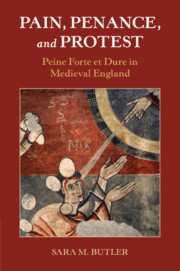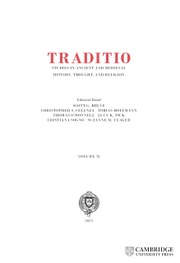Pain, Penance, and Protest
In medieval England, a defendant who refused to plead to a criminal indictment was sentenced to pressing with weights as a coercive measure. Using peine forte et dure ('strong and hard punishment') as a lens through which to analyse the law and its relationship with Christianity, Butler asks: where do we draw the line between punishment and penance? And, how can pain function as a vehicle for redemption within the common law? Adopting a multidisciplinary approach, this book embraces both law and literature. When Christ is on trial before Herod, he refused to plead, his silence signalling denial of the court's authority. England's discontented subjects, from hungry peasant to even King Charles I himself, stood mute before the courts in protest. Bringing together penance, pain and protest, Butler breaks down the mythology surrounding peine forte et dure and examines how it functioned within the medieval criminal justice system.
- The first book-length study of peine forte et dure; a punishment which involved placing heavy weights on the bodies of those who refused to plead to a criminal indictment
- Unveils the mythology surrounding peine fort et dure; how it was used not only to extract a plea, but also an opportunity for penance
- Integrates medieval law with religious culture, helping readers to better understand how the law functioned in practice
Reviews & endorsements
'Butler's book is a drastic revision of the prevalent obsolete narratives of the birth and development of English law. Butler shows that peine forte et dure was neither a barbaric, irrational penalty, nor prevalent, nor English, nor secular. Embedding legal practices in the intellectual and religious climate of the time, this book is a path-breaking, thought-provoking study.' Esther Cohen, Hebrew University of Jerusalem
'This is an important and richly rewarding book. Sara M. Butler triumphantly rescues peine forte et dure from its position as an awkward footnote to the history of the jury to the centre of an investigation into the meaning and purpose of the medieval English criminal trial and its consequences. Silence, in Butler's erudite and wide-ranging analysis, becomes exceptionally eloquent.' Richard W. Ireland, Senior Lecturer Emeritus, Aberystwyth University
'The accused stands mute in medieval court, ready to undergo torment rather than plead. What can explain this scene? In this engrossing study, Sara M. Butler takes us beyond the confines of legal history, exploring forgotten worlds of religious and cultural meaning.' James Q. Whitman, Yale Law School
'Sara Butler's magnificent new book recasts medieval legal history. … both a thoroughly engaging history and a scholarly tour de force.' Elizabeth Allen, Modern Philology
Product details
April 2024Paperback
9781009065726
488 pages
228 × 150 × 29 mm
0.73kg
Available
Table of Contents
- Introduction
- 1. Peine Forte et Dure: the medieval practice
- 2. Standing mute in the courts of medieval England
- 3. Due process and consent to jury trial
- 4. Peine as Barbarity? putting the practice in context
- 5. Why stand mute?
- 6. Standing mute as Imitatio Christi
- 7. Rejecting the jury, rejecting the common law, rejecting the king
- Conclusion
- Works cited
- Index.





.jpg)
